




Preview text:
Giải Unit 1 Lớp 10: 1E Word skills trang 15 Bài 1
SPEAKING Look at the title of the text and the photo. What do you think the story is about?
(Nhìn vào tiêu đề của bài đọc và bức ảnh. Bạn nghĩ câu chuyện này nói về điều gì?) Gợi ý đáp án
A girl sent a message in a bottle. (Một cô gái đã gửi một tin nhắn vào một cái chai.) Bài 2
Read the text. Who replied to Zoe's message? When did they reply, and from where?
(Đọc bài khóa. Ai đã phản hồi tin nhắn của Zoe’s? Họ đã phản hồi khi nào, và ở đâu?) Message in a bottle
In 1990, Zoe Lemon was on a ferry, sailing from Hull in England to Germany.
She was going on holiday with her family. The journey was long and tiring and
ten-year-old Zoe soon got bored. To pass the time, she decided to write a
message in a bottle and drop it into the sea. 'It will be interesting if someone
finds it,' she thought. Then she forgot about the bottle completely.
Twenty-three years later, she was amazed to get a reply from someone in the
Netherlands. A man was walking on the beach and was surprised to find Zoe's
bottle in the sand. He wrote to the address on the message, where Zoe's parents
still live. Zoe was delighted, but it was also very moving for her to see her
message again after twenty·three years, and she cried when she read it. 'It's
astonishing that the bottle didn't break,' said Zoe. Her five-year-old son thinks
it is all very exciting and wants to put a message in a bottle himself! Tạm dịch:
Tin nhắn trong một cái chai
Vào năm 1990, Zoe Lemon ở trên một chiếc phà, đi từ Hull ở Anh đến nước
Đức. Cô ấy đi nghỉ mát với gia đình của cô ấy. Chuyến đi rất dài và mệt mỏi và
cô bé Zoe 10 tuổi đã sớm thấy chán. Để giết thời gian, cô ấy quyết định viết
một tin nhắn, nhét vào một cái chai rồi thả nó xuống biển. Cô ấy nói rằng: “Sẽ
thú vị lắm nếu có ai đó tìm thấy nó.” Sau đó cô ấy hoàn toàn quên mất về chuyện đó.
23 năm sau, cô ấy rất king ngạc khi nhận được lời phản hồi từ ai đó ở Hà Lan.
Một người đàn ông đang đi bộ trên bờ biển và rất bất ngờ khi tìm thấy chai của
Zoe nằm trong cát. Anh ta viết đến địa chỉ trong tin nhắn, nơi mà bố mẹ Zoe
vẫn đang sống. Zoe rất vui mừng, nhưng cũng rất cảm động khi thấy lại bức tin
nhắn của cô ấy sau 23 năm, và cô ấy đã khóc khi đọc nó. “Thực sự rất ngạc
nhiên khi cái chai không bể”, Zoe cho biết. Đứa nhóc 5 tuổi của cô nghĩ rằng
chuyện đó rất thú vị và muốn tự tay bỏ một tin nhắn vào cái chai. Gợi ý đáp án
A man replied to the message. He replied in 2013 from the Netherlands. (Một
người đàn ông đã phản hồi tin nhắn. Anh ta trả lời vào năm 2013 từ Hà Lan.) Bài 3
Find all the -ed and -ing adjectives in the text in exercise 2. Complete the
rules in the Learn this! box.
(Tìm tất cả các tính từ có đuôi -ed và -ing trong bài đọc bài 2. Hoàn thành các
quy tắc trong hộp Learn this!)
LEARN THIS! -ed/ -ing adjectives
Many adjectives ending in (1) _____ describe how peoplefeel. Adjectives
ending in (2) describe something whichmakes them feel that way. Pairs of-ed /
-ing adjectiveslike these are formed from verbs, e.g. disappoint.
I'm disappointed. My exam result is disappointing Gợi ý đáp án
Các tính từ đuôi -ed/ -ing có trong bài khóa:
-ed: bored; amazed; surprised; delighted.
-ing: tiring; interesting; moving; astonishing; exciting
Many adjectives ending in (1) -ed describe how peoplefeel. Adjectives ending
in (2) -ing describe something whichmakes them feel that way. Pairs of-ed /
-ing adjectiveslike these are formed from verbs, e.g. disappoint.
(Nhiều tính từ kết thúc bằng đuôi ‘ed’ mô tả cảm xúc của con người. Các tính
từ kết thúc bằng đuôi ‘-ing’ mô tả thứ gì đó khiến người ta cảm thấy như thế.
Cặp tính từ “-ed/-ing” như vậy được hình thành từ các động từ, ví dụ như disappoint) Bài 4
Circle the correct forms to complete the sentences.
1. I don't find computer games very excited/ exciting.
2. Don't be frightened/ frightening. The dog won't bite.
3. I was shocked/ shocking when I heard the news
4. It's really annoyed/ annoying when you interrupt.
5. Why are you looking so worried/ worrying? Gợi ý đáp án 1. exciting 2. frightened 3. shocked 4. annoying 5. worried
1. I don't find computer games very exciting . (Tôi không thấy trò chơi trên máy tính có gì thú vị.)
Câu trên mô tả việc trò chơi trên máy tính không khiến bạn cảm thấy thú vị, nên ta sẽ chọn exciting.
2. Don't be frightened . The dog won't bite. (Đừng sợ hãi. Con chó không cắn đâu.)
Câu trên mô tả cảm xúc của người được nghe sợ hãi khi thấy con chó, nên ta sẽ chọn frightened.
3. I was shocked when I heard the news. (Tội bị bàng hoàng khi nghe tin.)
Câu trên mô tả cảm xúc bàng hoàng của người nói khi nghe tin, nên ta sẽ chọn shocked.
4. It's really annoying when you interrupt. (Khá là khó chịu khi cậu chen ngang đó.)
Câu trên mô tả việc ai đó cắt ngang khiến người nói khó chịu, nên ta sẽ chọn annoying.
5. Why are you looking so worried ?
Câu trên mô tả cảm xúc của người đang được nhắc đến, nên ta sẽ chọn worrried. Bài 5
Complete each pair of sentences with -ed and -ing adjectives formed from the verbs in brackets.
(Hoàn thành các cặp câu sau với các tính từ kết thúc bằng -ed và -ing từ các động từ.)
1. a. I don't understand this map. It's very _____. (confuse)
b. Can you help me with my maths? I'm _____. (confuse)
2. a. I was _____ when I fell over. (embarrass)
b. I hate it when my dad dances. It's so _____ .(embarrass)
3. a. Are you _____ in photography? (interest)
b. Which is the most _____ lesson in this unit? (interest) Gợi ý đáp án 1a. 1b. 2a. 2b. 3a. 3b. confusing confused
embarrassed embarrassing interested interesting Bài 6
SPEAKING Read the Learn this! box. Then work in pairs.
(Đọc hộp Learn this! Sau đó làm việc theo cặp)
Student A: Make a sentence using the past simple and the words below. Add your own ideas.
(Đặt câu dùng thì quá khứ đơn với các từ bên dưới. Thêm ý tưởng của bạn.)
Student B: React to the sentence using How + an -ing adjective.
(Phản ứng các câu nói dùng How + an + tính từ thêm -ing.)
1. I/ drop/ phone/ and it/ break
2. My dad/ dance/ my birthday party
3. My favourite football team/ lose/ the weekend Gợi ý đáp án
1. I dropped my phone and it broke. (Tôi đã đánh rớt điện thoại và nó bể.)
How annoying! (Thật khó chịu làm sao!)
2. My dad danced at my birthday party. (Bố mình đã nhảy múa ở bữa tiệc sinh nhật của mình.)
How amazing! (Thật kinh ngạc làm sao!)
3. My favourite football team lost a match last weekend. (Đội bóng ưa thích
của mình đã thua một trận đấu vào tuần trước.)
How sad! (Thật đáng buồn làm sao!)




